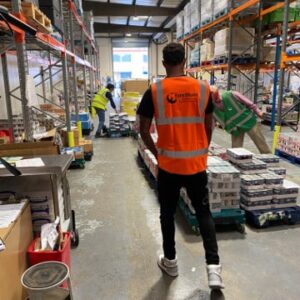Jasmine Birtles
Your money-making expert. Financial journalist, TV and radio personality.


The Trussell Trust forecasts that more than 600,000 people will need the support of its food banks over a three-month period.
Food banks across the Trussell Trust network are expecting to provide more than one million emergency food parcels between December 2023 and February 2024 – the most parcels ever provided across this period. This equates to an average of one food parcel every eight seconds (11,500 a day) and 7,000 people seeking support each day.
Between December and February last year, these food banks supported more than 220,000 children with emergency food, and 225,000 people who needed to use a food bank for the first time but it is anticipated these numbers will be even higher this year.
Food banks are calling on people in their local communities to donate, if they can, to ensure that they can continue to support everyone who needs their help.
While donations levels have remained stable compared to last year, the continued increase in need is leading to the vast majority of food banks having to purchase stock to make up for this shortfall. A recent survey of 282 food banks indicated that in the last three months 93% had to purchase food, at a time when prices are higher than ever, in order to keep up with the rising levels of need. These pressures have also led to one in three (32%) food banks reporting that they are concerned about being able to continue running at their current level in the coming months.
Despite these challenges, food banks in the Trussell Trust network are committed to doing all they can to help people in these challenging times but are having to adapt their operations in new ways in order to meet this challenge.
The Trussell Trust operate the largest network of foodbanks across the UK. You can search for your nearest food bank via their interactive map.
Note: some Trussell Trust foodbanks have closed in response to COVID-19. Contact your nearest Trussell Trust center for details.
FareShare is a national UK network of charitable food redistributors, formed from 18 independent organisations. Their mission is to acquire surplus food from companies and services across the food industry and redistribute it to nearly 9,500 community groups and frontline charities across the UK. That means school breakfast clubs, older people’s lunch clubs, homeless shelters and community cafes benefit from the supply of food creating almost a million meals for the vulnerable.
FareShare play an important part in saving good food from going to waste, which has been a well-documented problem in this country for decades.

Fareshare have two ways of getting food: one is a paid-for service with a FareShare Community Food Membership; the other is to chance to collect free surplus food from your local supermarket through FareShare Go. Once you’ve outlined your needs to FareShare, they will contact you to discuss how to proceed.
Fareshare doesn’t deliver to individuals, it delivers to lots of companies that do. On the website they have a full range here.
IFAN are the UK network for independent food aid providers. They support and connect a range of independent frontline food aid organisations while advocating on their behalf at a national level.
They have mapped 834 independent foodbanks. Please visit their website for more information.
The End Child Food Poverty website, spearheaded by Marcus Rashford’s End Child Food Poverty Taskforce, has a map which lists emergency food support in comunities across the UK. Find a project local to you by visiting the site here.
Feeding Britain are running a network of emergency food programmes across the UK to protect children and their families from hunger. Hot meals and food packages are being made available, through a combination of home deliveries and collection points in the communities in which we operate, to ensure families on low incomes can put breakfast, lunch, and dinner on the table each day. You can find out more via their website.
OLIO is a free app allowing neighbours to offer perfectly good, unwanted food to each other. Everything shared on OLIO is for free. They have also developed safe sharing ‘no-contact pickups’ in response to COVID-19.
When you join the FareShare Community Food scheme, a Regional Centre nearest to you will work with your needs and how to provide your food. There is a nominal fee to pay that covers their operational costs, and the food you receive will be surplus to supermarket shelves, therefore unused, and may come from a grower, a manufacturer or a retailer’s distribution centre.
Benefits of this scheme include:
A choice of the quantity and type of food you get
Regular food supplies
Food safety guidelines
Further opportunities such as volunteering
FareShare Go gives charities and community groups direct access to surplus food from many local supermarkets like ASDA, Tesco and Waitrose & Partners, and from Booker, the wholesale supermarket.
The food may have slightly damaged packaging or limited shelf life but the standard and safety of the food is not affected: this is good quality, wholesome food and includes bread, eggs and fresh fruit, always within the sell-by date.
Benefits of this scheme include:
Regular access to supermarket surplus food items
Zero cost for your organisation
A relationship with your local supermarket
Organisations that can demonstrate the provision of a safe food service to their users can apply, and you’ll also have access to help making sure your organisation has these standards:
Registry with the Environmental Health Office (EHO)
The ability to safely receive, store, prepare, serve/redistribute food
IEHO Basic Food Hygiene Course Certificate (or equivalent) held by your staff
Adherence to food safety legislation and current good practice
1 in 8 people in the UK regularly go hungry, yet thousands of tons of food is wasted every year: a rather shocking fact! FareShare are helping increase the amount of food delivered to charities feeding vulnerable people, and there are ways you can help. See FareShare’s guide for more information here.
Disclaimer: MoneyMagpie is not a licensed financial advisor and therefore information found here including opinions, commentary, suggestions or strategies are for informational, entertainment or educational purposes only. This should not be considered as financial advice. Anyone thinking of investing should conduct their own due diligence.

Great project well needed in this day and age!